.

The Science Behind Cannabis and Homeostasis
You might not realise it, but your body constantly works to keep your systems in a state of balance. Every time you encounter stimuli such as going for a run or catching a cold, your body kick-starts homeostatic mechanisms to keep you alive and functional. Researchers are keen to discover if cannabis can help to restore malfunctions in homeostasis.
Contents:
Unless you’re a scientist or an avid health nerd, you probably haven’t heard the word “homeostasis” since biology class. This in-built mechanism strives to keep the body in balance. Every time a stimulus, such as heat or physical exertion, challenges our body, homeostatic mechanisms ensure things don’t go too far in any direction. Below, you’ll learn all about homeostasis, and if cannabis manages to influence this vital process.
What Is Homeostasis?
Mechanisms within the human body work tirelessly to keep our physiology in a state of balance. Our bodies work optimally when certain variables are kept within specific “goldilocks zones”. Examples of this include:
- Blood pH between 7.35–7.45
- Blood pressure between 90/60–120/80mmHg
- Body temperature of around 37°C
Science refers to this biological balancing act as homeostasis. The Encyclopaedia Britannica defines[1] it as “any self-regulating process by which biological systems tend to maintain stability while adjusting to conditions that are optimal for survival”. While we’re at rest, without the variables of illness and infection, our body quite easily maintains processes such as blood sugar regulation, potassium and calcium balance, immune system activity, and hydration. However, things become a bit more challenging when we're exposed to certain stimuli, including infection, physical exertion, hunger, and high temperatures.
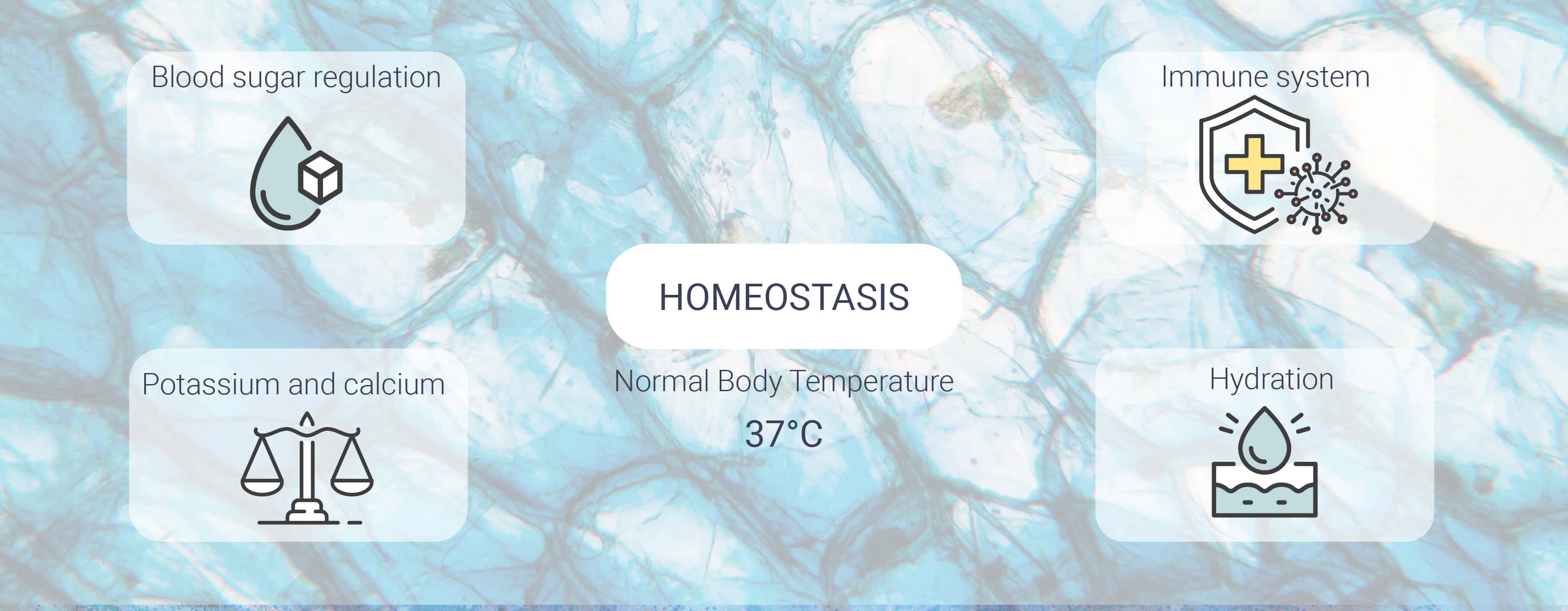
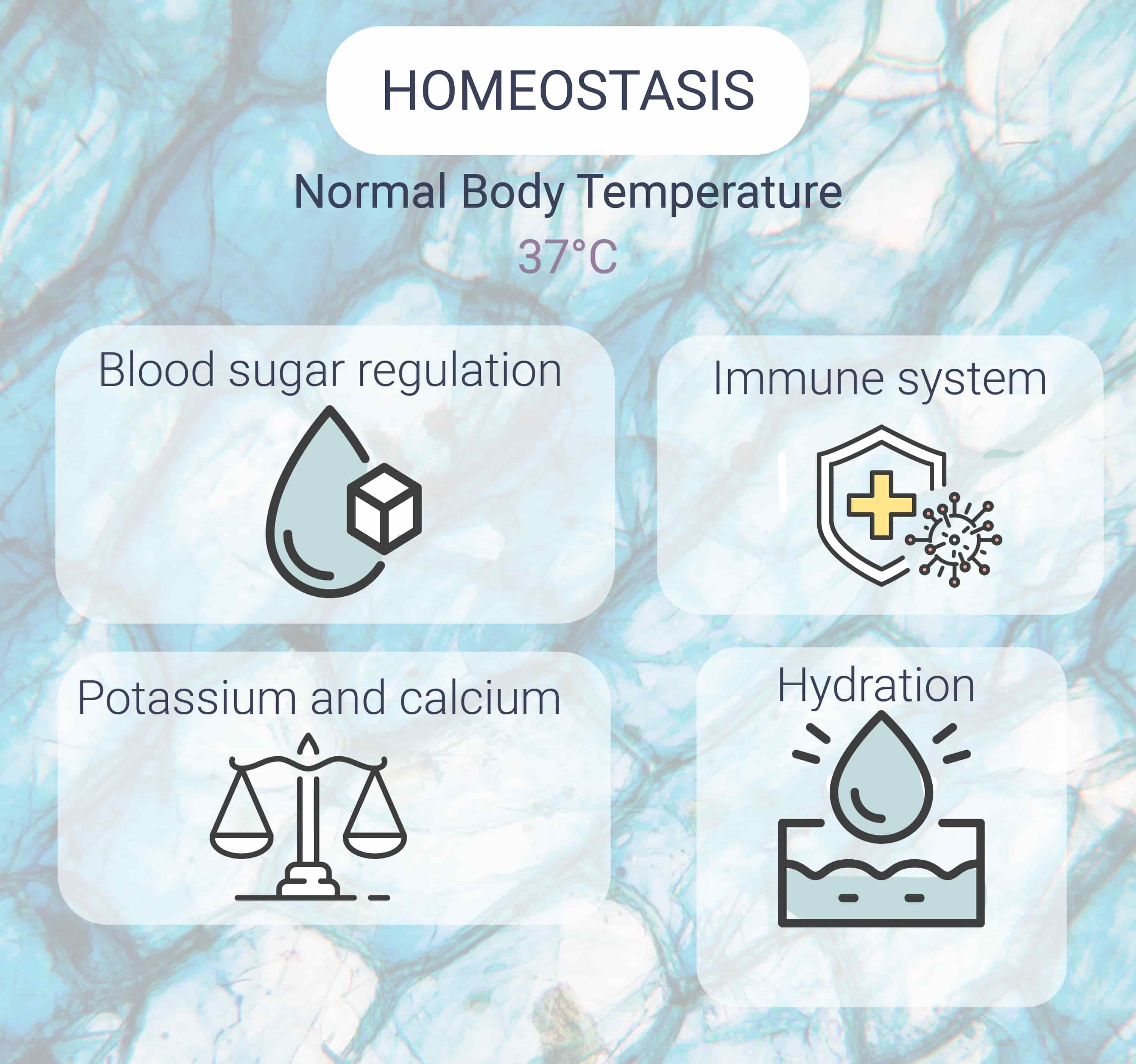
How Homeostasis Works
How does homeostasis work? It takes an orchestrated effort. Our bodies house trillions of cells that make up myriad tissues, organs, and glands (not to mention the trillions of commensal bacteria that call your body home).
Keeping all of these systems and cells working in harmony—and functioning well enough to keep us alive—requires communication. Various systems within the body work in concert to maintain homeostatic boundaries through hormonal excretion and electrical signalling. Our endocrine system, composed of several glands and organs, releases a cocktail of hormones that play important roles in keeping the body in a state of balance. Our central and peripheral nervous systems also send lightning-fast signals across the body that help to monitor, respond, and regulate. Together, the endocrine and nervous system form feedback loops that underpin homeostasis.
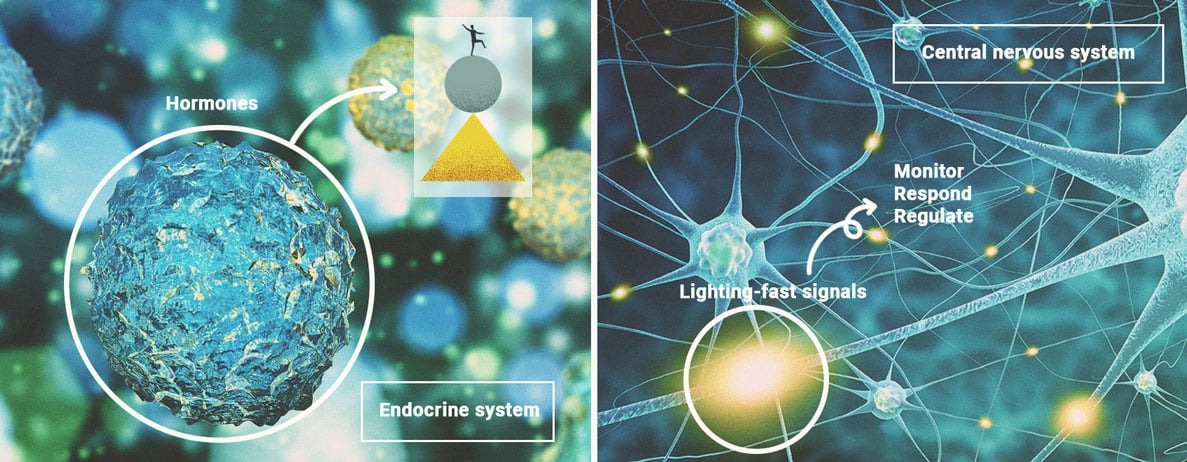
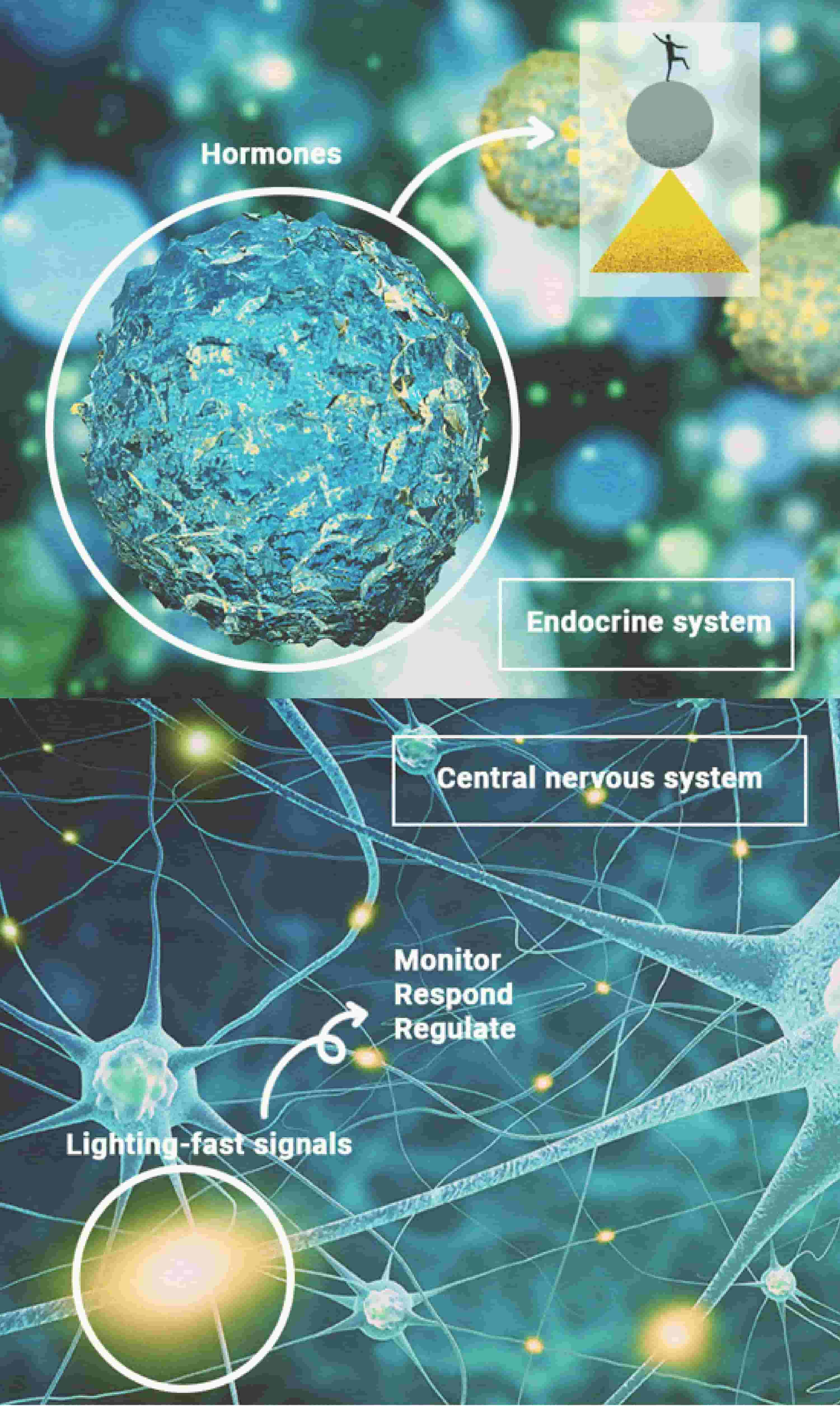
Feedback Loops
Feedback loops are mechanisms that the body uses to maintain homeostasis. There are two different kinds: positive, and negative feedback loops. Negative feedback loops feature four main stages in the form of stimulus, sensor, control, and effector. Using body temperature regulation as an example, these stages look like this:
- Stimulus: A fever causes body temperature to rise above 37°C.
- Sensor: Nerve cells in the skin and brain detect a rise in body temperature.
- Control: The hypothalamus works as a biological thermostat to regulate body temperature.
- Effector: The hypothalamus triggers hormonal cascades that result in the dilation of blood vessels and increased sweating. As the body loses heat, it gradually returns to the homeostatic sweet spot, and this mechanism ceases.
Whereas negative feedback loops work to oppose the initial stimulus, positive feedback loops boost the initial stimulus. These mechanisms work by seeing a process through to the end, instead of pulling things back into balance. Examples of positive feedback loops include the continuous release of oxytocin during contractions of childbirth, and the feeding of newborns that stimulates further milk production.
Homeostasis and Disease
The timeline of human progress has seen science conquer certain diseases that plagued our ancestors. However, the comforts of modernity, including sedentary living, high caloric intake, and access to inflammatory foods, have given rise to a set of diseases relatively rare among predecessors. These include:
- Type 2 diabetes
- Certain forms of cancer
- Obesity
- Atherosclerosis
- Autoimmunity (the immune system attacking the body)
- Certain psychiatric disorders
According to immunobiology researchers Maya Kotas and Ruslan Medzhitov, these conditions share two key factors in common[2]: they stem from malfunctioning homeostatic mechanisms, and they’re associated with chronic inflammation. While used as a means of defence against injury and infection, inflammation causes myriad physiological issues if it spirals out of control. Environmental variables, including diet, can displace physiological processes from their homeostatic zones. Take for example the excess consumption of sugar and subsequent dysfunction in glucose metabolism.
Cannabis and Homeostasis
Ongoing studies are pitching cannabis and its constituents against a plethora of disease models. Researchers are particularly interested in a subset of cannabis-derived metabolites known as cannabinoids. These molecules are able to influence the endocannabinoid system (ECS), the universal regulator of the human body. The ECS earned this prestigious title given its ability to drive homeostasis across myriad physiological systems; it underpins bone remodelling, governs neurotransmitter firing, facilitates skin functions, and even regulates our mood.
This vital system features three key parts: signalling molecules known as endocannabinoids, receptors that these molecules bind to, and enzymes that manufacture and break down these molecules.
Interestingly, cannabis-derived cannabinoids share a similar molecular structure to those created within the body. This means they’re also capable of binding to ECS receptors, and therefore have the capacity to influence our universal regulator. Constituents in cannabis can essentially “hack” this master regulatory network. However, to what degree these molecules impact our physiology remains the focus of scientific investigation.
THC and Homeostasis
You’ve heard of THC. This cannabinoid exists as the non-psychoactive cannabinoid acid THCA in raw flowers. Following exposure to heat, the molecule becomes THC, a compound capable of binding to certain ECS receptors in the brain, giving rise to the quintessential cannabis high.
Because THC binds to the two main receptors of the ECS, researchers are keen to find out if it can influence homeostasis across different systems. Researchers from Portugal[3] are testing the effects of THC on endocannabinoid homeostasis in human placenta, and scientists are also exploring the role THC plays in apoptosis. This term describes a tightly regulated process that dictates the controlled destruction of cells. Ultimately, apoptosis helps to keep cellular populations at healthy levels. In conditions such as cancer, the mechanism of apoptosis fails, which causes cells to multiply uncontrollably. Several studies[4] are testing THC on different types of cancer to see if it can induce apoptosis and impact cellular homeostasis in a positive manner.
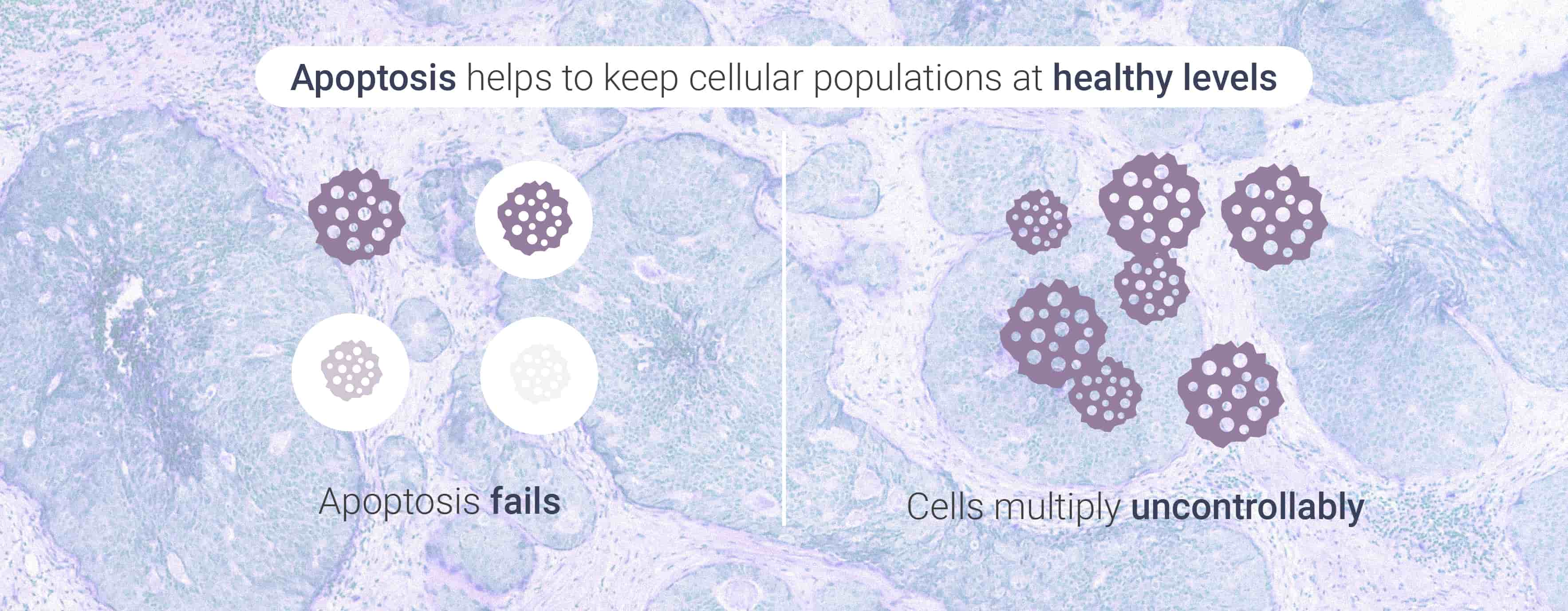
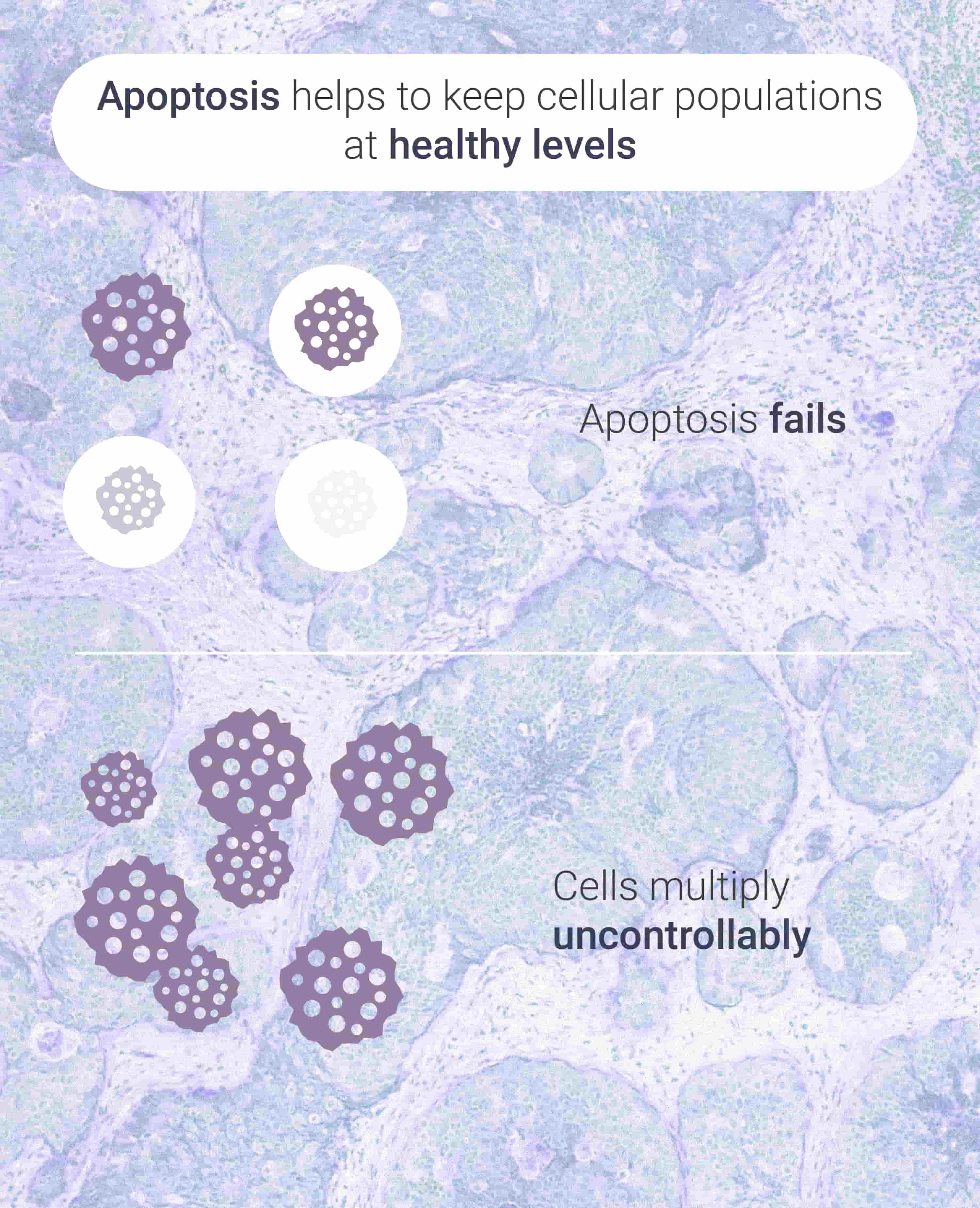
CBD and Homeostasis
So, what about CBD? Does this cannabinoid offer any promise when it comes to influencing the ECS and homeostasis in the body? Just like with THC, scientific investigations surrounding CBD remain early and inconclusive. However, numerous studies are exploring how CBD impacts elements of the ECS. For example, researchers from Germany are looking to determine if CBD works to block the action[5] of the enzyme fatty acid amide hydrolase (FAAH), a protein responsible for breaking down the endocannabinoid anandamide—a vital player in homeostasis. CBD also interacts with peroxisome proliferator-activated receptors (PPARs), a group of nuclear receptors involved in lipid and glucose homeostasis.
Deficiencies in the Endocannabinoid System
The ECS plays such an important role in body-wide homeostasis that things quickly go awry when the system malfunctions. The theory of clinical endocannabinoid deficiency[6] (CECD) posits that detrimental drifts in ECS function can result in the manifestation of disease. Neurologist and leading voice within the cannabis space Dr Ethan Russo presents the factor of endocannabinoid tone—an ideal quantity of circulating endocannabinoids within an individual's body—to dictate optimal homeostasis. These important signalling molecules are formed on demand from dietary compounds. However, environmental factors such as dietary deficiencies, as well as genetic factors, might reduce endocannabinoid tone below functional thresholds. Russo voices that skewed endocannabinoid tone could result in several health conditions, including:
- Irritable bowel syndrome
- Fibromyalgia
- Migraine
If this theory turns out to be true, interventions aimed at tinkering with endocannabinoid tone would help to manage symptoms. Strategies known to alter endocannabinoid levels include:
- Plant-derived cannabinoids
- Dietary omega fatty acids
- Aerobic exercise (running, swimming, cycling)
- Massage and acupuncture
Why Homeostasis Is Important
The mechanisms that underpin homeostasis keep us alive. Without them, simply going for a run or catching a cold would lead to our demise. Functional homeostatic regulation systems are key to the health of an organism. Given the role of the ECS in this vital mechanism, cannabis and its constituents are front and centre in research related to maintaining optimal homeostasis. Though research is preliminary, scientists are keen to unravel this complex but undeniably vital aspect of human biology.
- homeostasis | Definition, Function, Examples, & Facts | Britannica https://www.britannica.com
- Homeostasis, Inflammation, and Disease Susceptibility - PMC https://www.ncbi.nlm.nih.gov
- Effects of cannabis tetrahydrocannabinol on endocannabinoid homeostasis in human placenta | SpringerLink https://link.springer.com
- Anticancer mechanisms of cannabinoids - PMC https://www.ncbi.nlm.nih.gov
- Cannabidiol enhances anandamide signaling and alleviates psychotic symptoms of schizophrenia - PMC https://www.ncbi.nlm.nih.gov
- Clinical Endocannabinoid Deficiency Reconsidered: Current Research Supports the Theory in Migraine, Fibromyalgia, Irritable Bowel, and Other Treatment-Resistant Syndromes - PMC https://www.ncbi.nlm.nih.gov








































